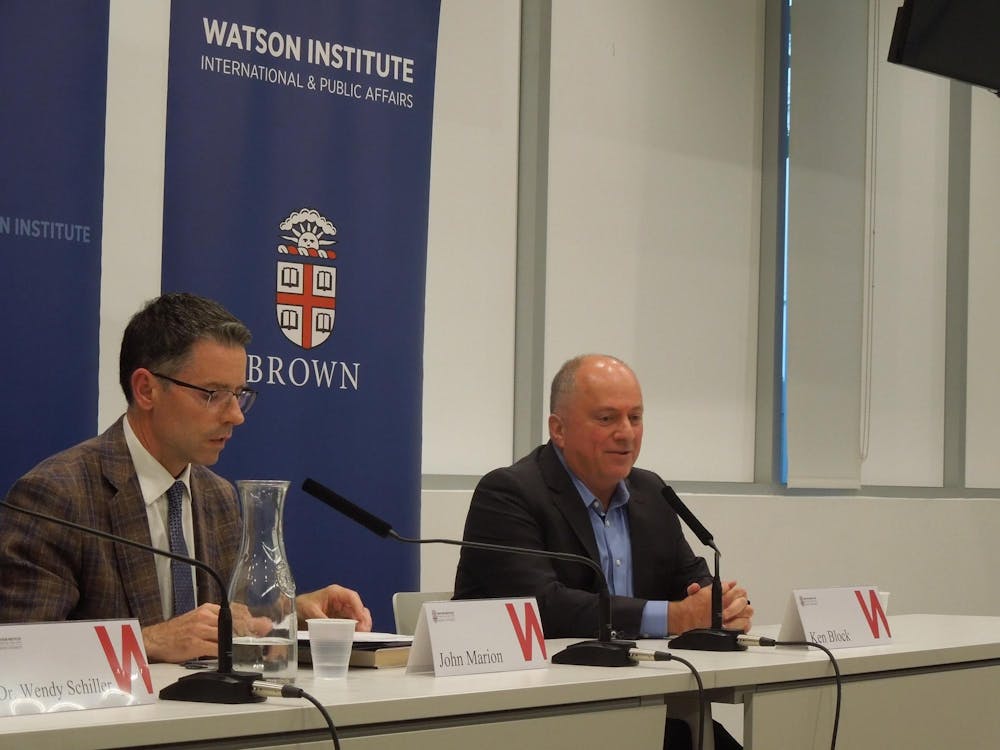Rhode Island political figures discussed election security and voter fraud at a Tuesday evening panel hosted by the Taubman Center for American Politics and Policy.
The discussion featured John Marion, the executive director of Common Cause Rhode Island, a voting rights nonprofit, and Ken Block, the founder of Rhode Island’s moderate party who has authored a book on voter fraud. Their conversation was facilitated by Wendy Schiller, the director of the Taubman Center and interim director of the Watson Institute for International and Public Affairs.
Block has extensive experience investigating voter fraud. “I’m the guy the Trump campaign called out of the blue the day after the election in 2020,” he said. Block’s company specializes in analyzing voter data. Trump’s team gave him an offer to investigate the 2020 election, which laid the foundation for his book “Disproven.”
Block hesitantly agreed to the project, warning Trump’s campaign that they “shouldn’t have any expectations” that he would find evidence of election fraud. Block was “unable to find any voter fraud that … could have changed the course of an election.” He was later named a Time Magazine Defender of Democracy for this work.
Common Cause Rhode Island works to improve voting rights and election administration, including supporting the passage of a risk-limiting post-election audit in 2017, which is now a key election security measure, Marion said.
“The greatest threat to our elections is misfeasance, not malfeasance,” he added, explaining that understaffed and underfunded polling sites, a dependence on voting machines and “ignorance and incompetence” are the root of most problems in elections.
Voter registration was a major focus of the talk.
Block argued against voter registration, saying that voter registration was instituted to restrict voting and instead suggesting a national voter registration based on an ID that all native-born and naturalized citizens would have.
“We’ve kind of backed into this weird system where driving and having a license is very closely linked to voting,” Marion said. While it has a logical backstory, this link often creates problems, he added. One of his daughters chose not to get her driver’s license, so “she wasn’t offered the chance to register to vote,” he described.
Block pointed to an example of another fault in the registration process: double registration.
In 2022, “there were 40 individuals registered to vote in Arizona and in some other state,” he explained. He noted that “the narrative that voter fraud is a Democrat crime is not true,” adding that “35 of those 40 fraudulent votes … were Republicans.”
But Marion countered Block’s characterization.
“There’s a logical explanation for the vast majority of the duplicate registrations,” he said.
Marion’s daughters are temporarily double-registered between Rhode Island and the states they reside in for college due to delays in the registration process, he explained.
Block suggested removing them from voting rolls once they change states, but federal protections often make this difficult. Marion explained that the protections tie back to the exclusion of Black voters in the Jim Crow era, making these policies “so incredibly important.”
Following an audience question about the role of technology to address election skepticism, Block and Marion weighed the current political climate and election practices.
This is a “tricky” issue, Marion explained.
“There’s an active movement by election deniers to push for the hand counting of ballots, even though the scientific evidence is that hand counting ballots … is more inaccurate than using automated tabulation,” he said.
“I don’t think you solve the problem of the skepticism about how we run our elections until the current class of candidates stops beating it as a rallying cry to their base,” Block added.
Nick Lima, Cranston Director of Elections, attended the Tuesday event to learn more about how to combat voter misinformation on election security.
“Voters from across the spectrum…need to have an understanding of how our elections work…so that they can trust it when they vote,” he told The Herald.
“We have moved mountains to make elections more secure and have more integrity over the last eight years,” Lima said, “but the public doesn’t really hear that.”
Schiller “wanted to provide a form of information for Brown students and the general public on voting rules, electoral security, registration and the definition of voter fraud,” she said in an interview with The Herald.
She hopes attendees leave the event understanding that “the typical voter fraud that people think about doesn’t actually exist.”
Pavani Durbhakula is a senior staff writer and photographer. She is a first-year from DC and plans to study IAPA and Public Health. In her free time, she enjoys baking, reading, and searching for new coffee shops.





